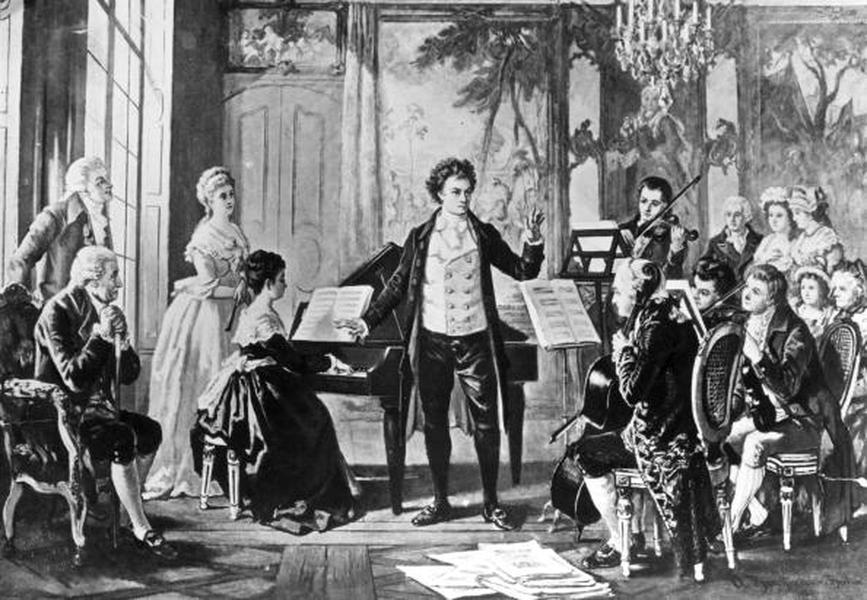Researchers wonder if an irregular heartbeat was behind Beethoven's success


A free daily email with the biggest news stories of the day – and the best features from TheWeek.com
You are now subscribed
Your newsletter sign-up was successful
A cardiologist, internal medicine specialist, and musicologist have raised an unexpected theory: Was an irregular heartbeat the key to Ludwig van Beethoven's success as a composer?
"When your heart beats irregularly from heart disease, it does so in some predictable patterns," one of the researchers, internal medicine specialist Joel D. Howell, told the Los Angeles Times. "We think we hear some of those patterns in his music." Beethoven died at the age of 56, and while he was known to be deaf, historians believe he could have also suffered from alcohol-induced cirrhosis, lead poisoning, and syphilis. The study's authors believe he was also predisposed to atrial fibrillation, atrial flutter, or multifocal atrial tachycardia, and looked at a few of his compositions that stood out as being unusual for their time period.
One piece, the Piano Sonata in E flat major (Opus 81a) had a "distinctive 'galloping' rhythm" in the adagio section, and the authors heard slow, irregular heartbeats followed by "racing" irregular heartbeats, in the allegro section. In his String Quartet No. 13 in B flat major (Opus 130), the authors heard "a short paroxysm of atrial tachyarrhythmia," and noted that Beethoven wrote that the passage should be played with a "heavy heart."
The Week
Escape your echo chamber. Get the facts behind the news, plus analysis from multiple perspectives.

Sign up for The Week's Free Newsletters
From our morning news briefing to a weekly Good News Newsletter, get the best of The Week delivered directly to your inbox.
From our morning news briefing to a weekly Good News Newsletter, get the best of The Week delivered directly to your inbox.
The team knows that their research was "entirely speculative," but they also noted that "in highly charged passages of certain pieces, the possibility of cardiac arrhythmia can lend a quite physical aspect to one's interpretation of the music in question. These passages can seem, in an unexpected literal sense, to be heartfelt." --Catherine Garcia

A free daily email with the biggest news stories of the day – and the best features from TheWeek.com
Catherine Garcia has worked as a senior writer at The Week since 2014. Her writing and reporting have appeared in Entertainment Weekly, The New York Times, Wirecutter, NBC News and "The Book of Jezebel," among others. She's a graduate of the University of Redlands and the Columbia University Graduate School of Journalism.
-
 Political cartoons for February 21
Political cartoons for February 21Cartoons Saturday’s political cartoons include consequences, secrets, and more
-
 Crisis in Cuba: a ‘golden opportunity’ for Washington?
Crisis in Cuba: a ‘golden opportunity’ for Washington?Talking Point The Trump administration is applying the pressure, and with Latin America swinging to the right, Havana is becoming more ‘politically isolated’
-
 5 thoroughly redacted cartoons about Pam Bondi protecting predators
5 thoroughly redacted cartoons about Pam Bondi protecting predatorsCartoons Artists take on the real victim, types of protection, and more
-
 ‘One Battle After Another’ wins Critics Choice honors
‘One Battle After Another’ wins Critics Choice honorsSpeed Read Paul Thomas Anderson’s latest film, which stars Leonardo DiCaprio, won best picture at the 31st Critics Choice Awards
-
 Son arrested over killing of Rob and Michele Reiner
Son arrested over killing of Rob and Michele ReinerSpeed Read Nick, the 32-year-old son of Hollywood director Rob Reiner, has been booked for the murder of his parents
-
 Rob Reiner, wife dead in ‘apparent homicide’
Rob Reiner, wife dead in ‘apparent homicide’speed read The Reiners, found in their Los Angeles home, ‘had injuries consistent with being stabbed’
-
 Hungary’s Krasznahorkai wins Nobel for literature
Hungary’s Krasznahorkai wins Nobel for literatureSpeed Read László Krasznahorkai is the author of acclaimed novels like ‘The Melancholy of Resistance’ and ‘Satantango’
-
 Primatologist Jane Goodall dies at 91
Primatologist Jane Goodall dies at 91Speed Read She rose to fame following her groundbreaking field research with chimpanzees
-
 Florida erases rainbow crosswalk at Pulse nightclub
Florida erases rainbow crosswalk at Pulse nightclubSpeed Read The colorful crosswalk was outside the former LGBTQ nightclub where 49 people were killed in a 2016 shooting
-
 Trump says Smithsonian too focused on slavery's ills
Trump says Smithsonian too focused on slavery's illsSpeed Read The president would prefer the museum to highlight 'success,' 'brightness' and 'the future'
-
 Trump to host Kennedy Honors for Kiss, Stallone
Trump to host Kennedy Honors for Kiss, StalloneSpeed Read Actor Sylvester Stallone and the glam-rock band Kiss were among those named as this year's inductees
